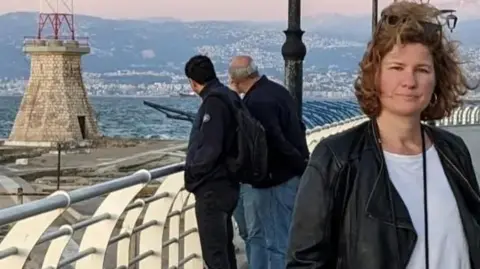The UK government has chartered a commercial flight out of Lebanon to assist British nationals trying to flee the fighting, the foreign secretary has announced.
The situation was "volatile" and had the potential to "deteriorate quickly", David Lammy said, just hours before Israel announced the start of a "localised and targeted" ground operation in southern Lebanon.
British nationals and their spouse or partner, and children under the age of 18 are eligible to take the flight, with vulnerable people a priority.
The plane is scheduled to leave on Wednesday from Beirut, which was hit by fresh Israeli air strikes overnight.
As of last week, there were thought to be between 4,000 and 6,000 UK nationals, including dependants in Lebanon.
The UK government will pay to charter the flight, which will depart from Beirut-Rafic Hariri International Airport, but British nationals will be expected to pay a fee of £350 per seat.
British nationals and dependants will be eligible to request a space on the flight. Any non-British dependants boarding the flight will require a visa, granted for at least six months, to enter the UK.
Lammy said on Tuesday that the foreign office was seeking to put on more charter flights. But he cautioned that while the UK was in "constant dialogue" with Israel, "I have been warning and cautioning that we cannot make guarantees".
Any further flights in the coming days will depend on demand and the security situation on the ground, the Foreign Office said.
Speaking to reporters on Monday, Lammy added: "I urge them to leave because the situation on the ground is fast-moving and of course whilst we will do everything we can to protect British nationals, and those plans are in place to do so, we cannot anticipate the circumstances and the speed with which we can do that if things escalate in a major way over the coming hours and days."
A few hours later the Israeli military said a "limited, localised and targeted" ground operation was under way against Hezbollah, the Iran-backed armed group.
Air strikes hit a southern suburb of Beirut, after the Israeli military warned residents there to evacuate.
The foreign secretary said the government had been urging British nationals to leave Lebanon "for months".
"I have been warning since coming into office in July that British nationals should leave Lebanon," he said. "Indeed, the previous government was saying do not travel to Lebanon."
Victoria Lupton, 37, is planning to leave Lebanon on Wednesday with her young family - but not on the flight chartered by the UK government.
"A week ago the British government emailed us saying we should be buying our own flight, which was quite a difficult message to receive because there were no flights to be had," she told the BBC on Tuesday.
"I eventually managed to get a flight to Athens, which is leaving tomorrow. Then last night, late at night, the British government messaged saying they had chartered one flight and would I like a place on it. But that's leaving tomorrow so I am sticking with my existing flight."
She spends a couple of months a year in Lebanon as the founder and chief executive of Seenaryo, a non-profit organisation which helps educate Middle Eastern women and children through theatre and play.
She told the BBC: "I'm feeling sick. All of us are feeling sick and living in a state of terror."
"I have a three-year-old and I was moving my daughter's cot as far away as possible from the windows to make sure she didn't get hit. None of us are sleeping. We are only sleeping a few hours a night. It's a very, very difficult worrying time."
 Victoria Lupton
Victoria LuptonThe Israeli government says the aim of its military operation is to enable 60,000 displaced Israelis to return to their homes. Hezbollah says its fighters are ready to confront an Israeli invasion.
According to officials in Lebanon, more than 1,000 people have been killed in the past two weeks, while up to a million may now be displaced.
Lammy and his US counterpart Antony Blinken spoke by phone on Monday. He said they had seen the media reports and were both urging "de-escalation".
He added the UK would be keeping in touch with Iran, and reiterated the call for a 21-day ceasefire to enhance the prospect of a political solution.
Speaking on Tuesday, Lammy said: "The way forward is a political solution, not a military one."
His comments come after Sir Keir Starmer last week told British nationals in Lebanon to "leave immediately" as fighting intensified between Israel and Hezbollah.
Britons had previously been advised to book flights out of the country - but there were limited options available, with most airlines except the national carrier having cancelled flights.
The Ministry of Defence has sent nearly 700 troops to nearby Cyprus to prepare for the possible evacuation of British nationals from Lebanon and the government "continues to advise against all travel to Lebanon".
Tensions have been growing across the Middle East since Hamas gunmen attacked Israel on 7 October last year, killing about 1,200 people and taking 251 others as hostages.
The Israel military campaign in Gaza in response to the Hamas attack has killed more than 41,000 people, according to the Hamas-run health ministry.
Previously sporadic fighting between Israel and Hezbollah escalated on 8 October - the day after Hamas's unprecedented attack. Hezbollah fired at Israeli positions, in solidarity with Hamas.
Hezbollah has launched more than 8,000 rockets at northern Israel and the Israeli-occupied Golan Heights. It has also fired anti-tank missiles at armoured vehicles and attacked military targets with explosive drones.
Families of hostages in Gaza held a news conference in London, along with the relatives of other British-Israelis killed on 7 October, following a memorial event at Downing Street.
They said they felt let down and called on the government to do more to free their relatives. Earlier, they met Sir Keir and Lammy.


Post a Comment